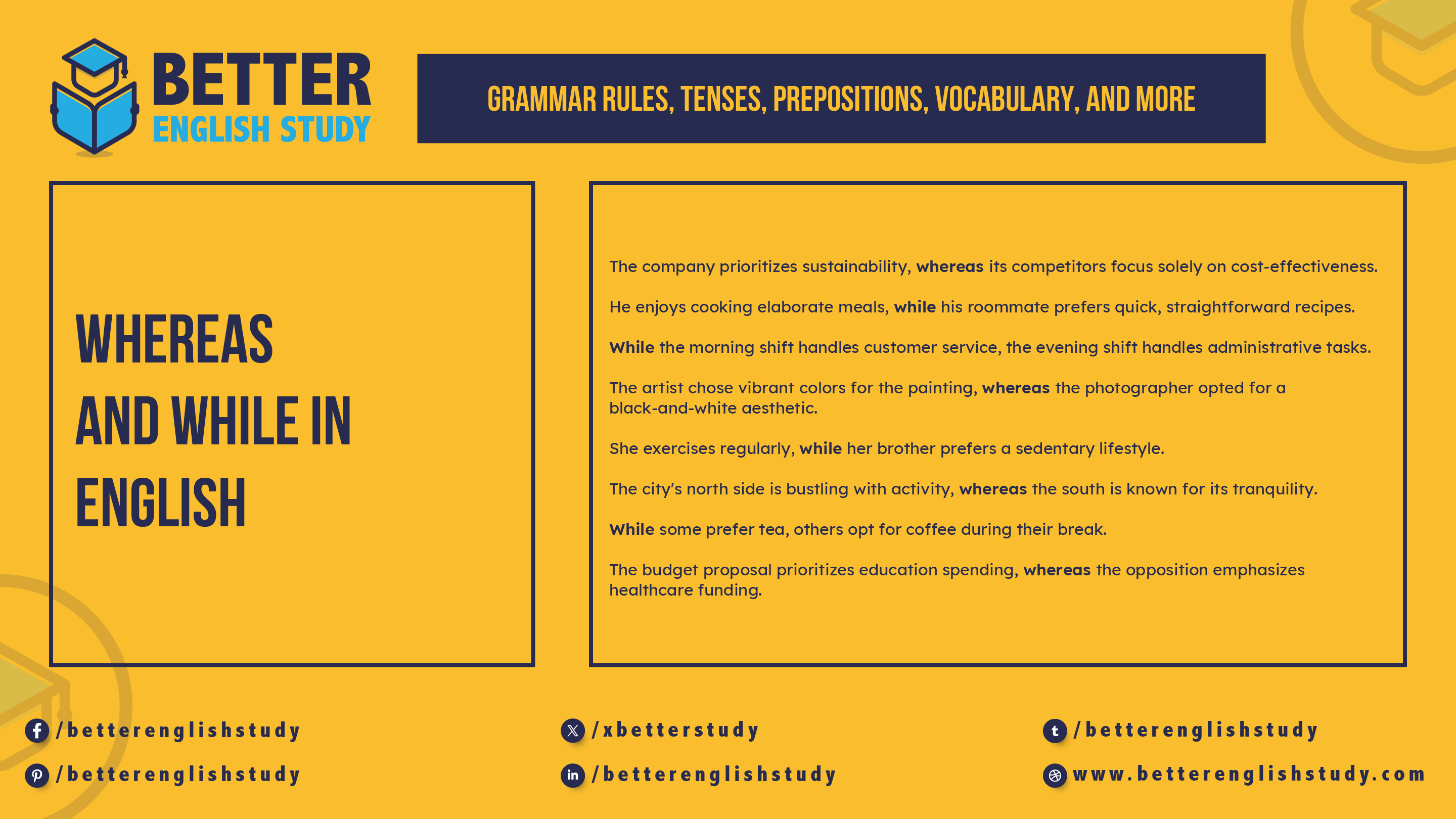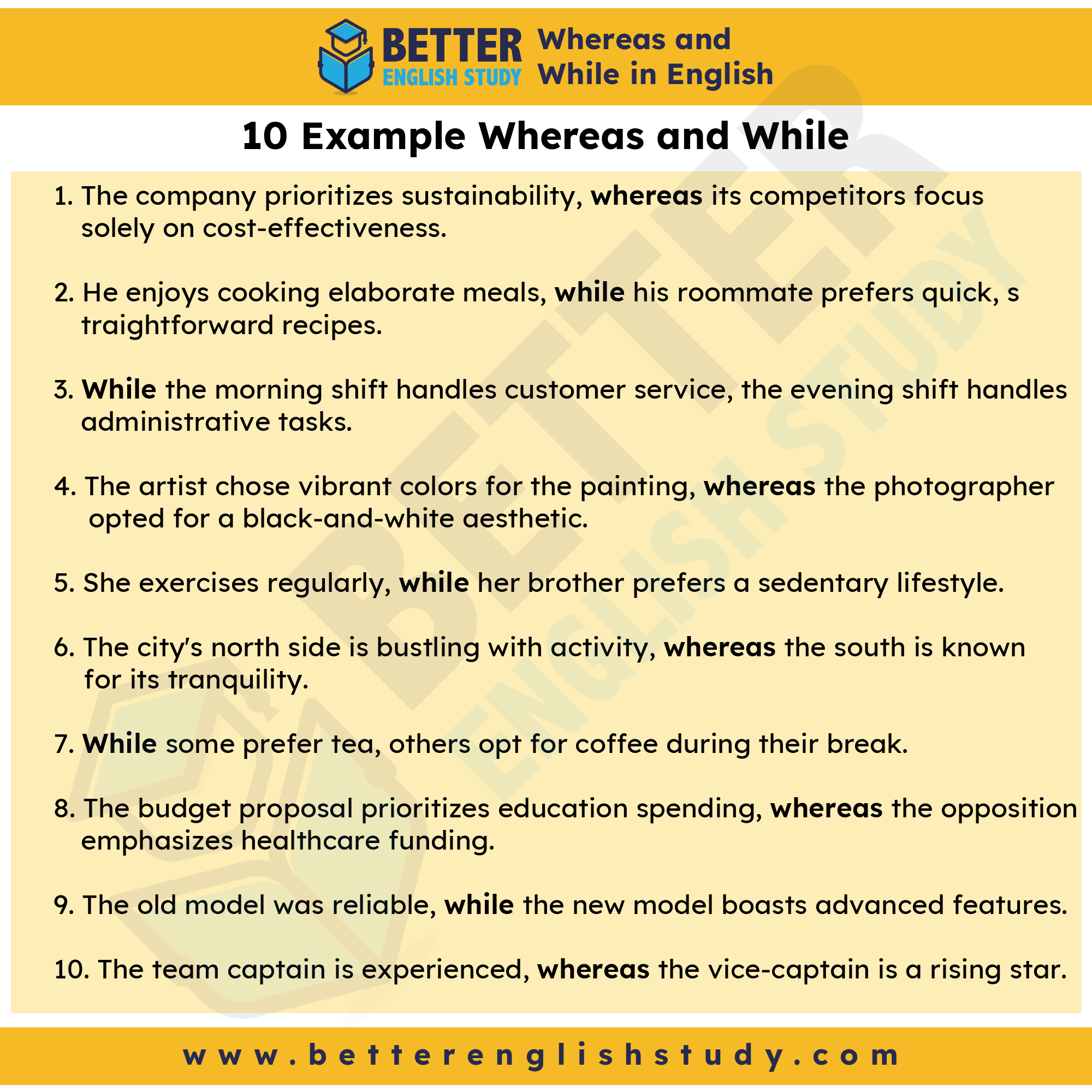
In the vast landscape of the English language, conjunctions serve as bridges that connect different parts of a sentence, facilitating smooth transitions and conveying nuanced relationships between ideas. “Whereas” and “while” are two such conjunctions, each with its unique purpose.
In this article, we will explore when to use “whereas” and “while,” understand their differences and provide examples showcasing their usage.
When to Use Whereas in a Sentence
“Whereas” is a conjunction commonly used to introduce a contrast or comparison between two contrasting elements or ideas. It is often employed to set up a comparison, highlighting differences or opposition.
Examples:
- The team excelled in the preliminary rounds, whereas they struggled in the finals.
- She enjoys reading fiction, whereas her brother prefers non-fiction.
The first proposal focused on cost-cutting, whereas the second proposal emphasized innovation.
When to Use While in a Sentence
“While” is a versatile conjunction that serves multiple purposes. In the context of contrasting ideas, it is used to link two contrasting thoughts or actions. Additionally, “while” can denote a period of time, indicating the simultaneous occurrence of two actions.
Examples:
- He studied diligently while his friends were out enjoying the party.
- While the first team focused on speed, the second team emphasized precision.
She likes to relax with a book, while her brother prefers to watch movies.
What is the Difference Between Whereas and While?
The primary difference lies in their functions within a sentence. “Whereas” is typically used to introduce a contrast or comparison, emphasizing differences between ideas or situations. On the other hand, “while” can serve both as a contrasting conjunction and as a temporal conjunction indicating simultaneous actions.
Examples:
- The morning commute is hectic, whereas the evening commute is relatively calm.
Emphasizing the differences between the morning and evening commutes
- She enjoys gardening while her husband prefers to read.
Indicating the simultaneous actions of gardening and reading
- The old system was complex, whereas the new system is user-friendly.
Emphasizing the differences between the old and new systems
- He works on his laptop while listening to music.
Indicating the simultaneous actions of working and listening to music
Whereas and While Examples
- The company prioritizes sustainability, whereas its competitors focus solely on cost-effectiveness.
- He enjoys cooking elaborate meals, while his roommate prefers quick, straightforward recipes.
- While the morning shift handles customer service, the evening shift handles administrative tasks.
- The artist chose vibrant colors for the painting, whereas the photographer opted for a black-and-white aesthetic.
- She exercises regularly, while her brother prefers a sedentary lifestyle.
- The city’s north side is bustling with activity, whereas the south is known for its tranquility.
- While some prefer tea, others opt for coffee during their break.
- The budget proposal prioritizes education spending, whereas the opposition emphasizes healthcare funding.
- The old model was reliable, while the new model boasts advanced features.
- The team captain is experienced, whereas the vice-captain is a rising star.

What is the Same as Whereas – Whereas Synonyms?
Synonyms for “whereas” include “while,” “however,” and “but.”
Examples:
- The project was successful, while the initial stages faced challenges.
- The plan seemed promising; however, unforeseen obstacles arose.
- The team performed exceptionally, but the results differed from what was expected.
Can We Start a Sentence with Whereas?
It is grammatically correct to start a sentence with “whereas.” It is often used to introduce contrasting clauses or statements.
Examples:
- Whereas the morning was sunny, the afternoon brought heavy rain.
- Whereas some prefer traditional methods, others embrace modern technologies.
- Whereas the team excelled in offense, their defense strategy needed to be improved.
What is the Opposite of Whereas – Whereas Antonyms?
Antonyms for “whereas” include “although,” “nevertheless,” and “yet.”
Examples:
- The movie received mixed reviews, although it was highly anticipated.
- The experiment faced challenges; nevertheless, valuable insights were gained.
- The team worked diligently, yet the results were disappointing.
Should I Use Whereas or While in This Sentence?
The choice between “whereas” and “while” depends on the context and the intended meaning. If the aim is to highlight a contrast between two elements or ideas, “whereas” is more fitting. Suppose the focus is on presenting simultaneous actions or events; “while” is the appropriate choice.
Examples:
- She enjoys cooking elaborate meals, whereas/while her brother prefers quick and straightforward recipes.
- The city’s north side is bustling with activity, whereas/while the south side is known for its tranquility.
In conclusion, “whereas” and “while” are valuable conjunctions in English, linking ideas that contrast or indicate simultaneous actions. Understanding their distinctions and using them appropriately enhances the precision and clarity of your expressions.
